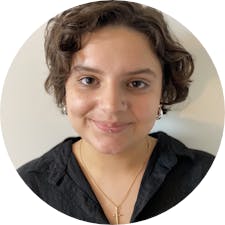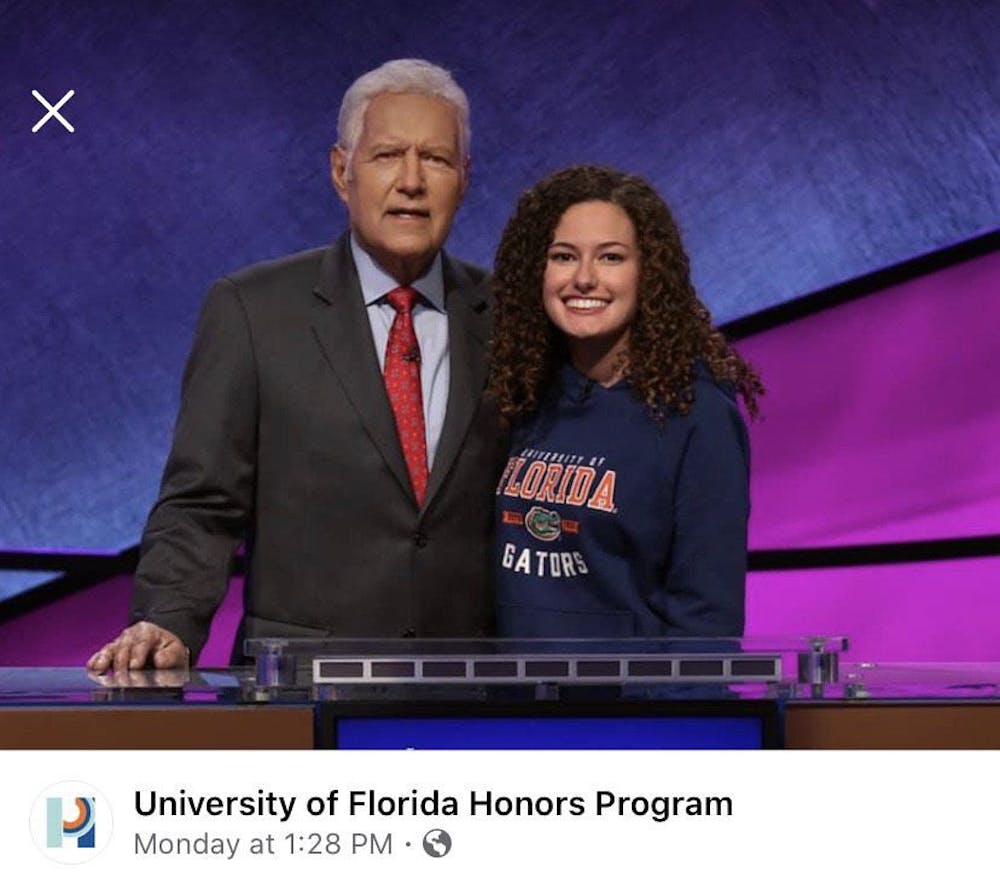Kayla Kalhor found herself stiff while competing on the iconic Jeopardy stage. She stood on a platform to make her and the other contestants appear the same height and noticed the set looked shockingly bigger in person than on TV.
“I was pretty nervous,” Kalhor said. “But I wasn’t as nervous as I expected to be.”
Kalhor, a 19-year-old UF chemistry sophomore, represented UF while competing in the Jeopardy! College Championship Tuesday evening. In the game show, participants hear a series of clues from various trivia categories and guess the answer in the form of a question. Whoever gains the most points, or cash, is the winner of the round.
Before Kalhor, two other UF students competed in the Jeopardy! College Championship. UF students haven’t been on the college championship since 1994.
Jeopardy! has an average of 23 million viewers per week, though the numbers have gone up since people are staying home because of COVID-19, Jeopardy has a number of accolades, which include 35 Emmys and the top-rated quiz show on TV.
In every episode, three students across a variety of national universities compete against each other, and each round’s winner advances to the semifinals. The winners from the semifinals advance to the finals for a chance to win the prize money but do not get to keep the money they score in each round, said Alison Shapiro Cooke, the spokesperson for Jeopardy!
To get on the show, Kalhor and all other contestants had to pass a test offered on the show’s website once a year, participate in a regional audition, pass a written test and then play a practice game, Cooke said.
She came in second place with earnings of $16,501 but placed behind Yale University student Nathaniel Miller who scored $24,001. Sophie Casarico from Florida State University came in last place.
Kalhor, Miller and Casarico competed in the second episode of the Jeopardy! College Championship, in which a total of 15 students compete for the prize of $100,000 over the course of two weeks, Cooke said.
Quarter finalists receive $5,000 for participating, semi-finalists receive $10,000, third place gets $25,000 and second place gets $50,000.
Kalhor said she couldn’t see herself beating Miller, so she strategically played for a wild card spot. The wild card contestants are chosen after all 15 contestants have competed, and the four highest-scoring non-winners can have spots in the semifinals, which air April 13-15, Cooke said. The finals air April 16 and 17.
Although Kalhor cannot speak on whether or not she made it to the semifinals, she said her score historically gets a contestant a wildcard spot.
Kalhor has watched Jeopardy since her junior year of high school and has participated in the quiz bowl team at UF since freshman year, a trivia team that competes with other colleges in the U.S. Kalhor said much of the content she learned from the team carried over to Jeopardy.
During the episode, posts on Twitter commented that Kayla “had no personality,” was “humor-free” and “a real downer.” Cecelia Crowly, 21, a junior at Rio Salado College liked one of these tweets.
“She may have perhaps smiled a bit more or seemed a little more enthusiastic,” Crowly said.
Jenna Callison, a 20-year-old UF African American studies and history sophomore, went on Twitter and defended Kalhor, her roommate and friend, when a user mentioned that she should “get a personality.”
“Actually, Kayla has a great personality and got a scholarship to study abroad because she’s so smart!” Callison tweeted.
Kalhor brushed off the criticisms of her performance.
“These people don’t really see you as a real person, just someone inside the TV,” Kalhor said. “So you can’t take it to heart too much.”
Kalhor has watched Jeopardy since her junior year of high school and has participated in the quiz bowl team at UF since freshman year, a trivia team that competes with other colleges in the U.S. Kalhor said much of the content she learned from the team carried over to Jeopardy.
Kalhor has wanted to attend medical school since shadowing an orthopedic surgeon in high school, which is why she thought she would excel in the Health and Medicine category.
However, in a blow that cost her $3,000 from her score, she mispronounced the word “arrhythmia.” Host Alex Trebek said she mispronounced the word to a point where she could not receive the points even though she had the word right, but not the pronunciation.
“I thought that Health and Medicine category would be the one for me, but clearly it wasn’t,” Kalhor said.
Besides that, Kalhor enjoyed British Literature and the final Jeopardy clue, which was “A 1711 bill cleared the names of 22 people who were tried in this town, including Rebecca Nurse, Giles Corey & John Proctor.” The answer was Salem, Massachusetts.
“If I knew it would have been that easy, I would have bet more,” Kalhor said.
Contact Allessandra Inzinna at ainzinna@alligator.org. Follow her on Twitter @ainzinna.
The University of Florida Honors Program posts a photo on Facebook Monday of Jeopardy! host Alex Trebek and Kayla Kalhor, a 19-year-old UF chemistry sophomore who competed in the show's College Championship.

Allessandra is a third-year journalism major with a minor in English. In the past, she has covered local musicians and the cannabis industry. She is now the Student Government reporter for The Alligator. Allessandra paints and plays guitar in her free time.






